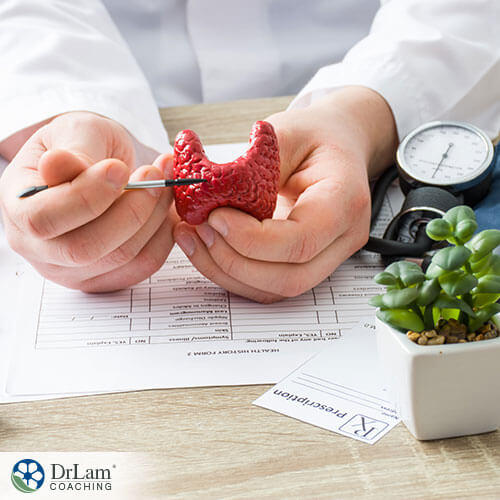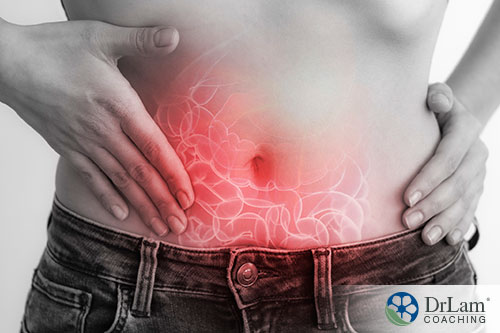 Everyone knows they have a gut. After all, that’s where digestion takes place. Your thyroid carries out several important functions in your body. It helps regulate your digestion, heart, metabolism, and muscle control. Also, it plays a role in your mental health. But did you know there is a gut thyroid connection?
Everyone knows they have a gut. After all, that’s where digestion takes place. Your thyroid carries out several important functions in your body. It helps regulate your digestion, heart, metabolism, and muscle control. Also, it plays a role in your mental health. But did you know there is a gut thyroid connection?
You may have been told by your healthcare professional that hypothyroidism comes from an inherited condition and that you can take medication for it. But did he or she tell you it may come from an autoimmune condition and could be connected to your gut?
Because of this possibility of an autoimmune origin for your hypothyroidism, the gut thyroid connection becomes important.
More and more recent research shows the gut thyroid connection. Part of this comes because the thyroid plays a role in regulating various parts of the body and in how hormones affect those parts.
For example, the thyroid’s role in hormone production includes the hormones that protect the gut. The thyroid hormones T3 and T4 act to strengthen the gut. As a result, these two hormones work to prevent stress-related ulcers. So your gut depends on your thyroid for protection.
Also, gut problems that affect the thyroid can occur when the lining of the gut, called the epithelium, becomes too permeable. Normally, the single-cell lining prevents the passage of material from the gut to the bloodstream. But conditions like SIBO, small intestine bacterial overgrowth, can lead to the usually tight junctions between these cells to become loose. This causes a condition called ‘leaky gut’. This condition often occurs when the inflammation circuit of the NeuroEndoMetabolic (NEM) stress response mechanism becomes dysfunctional.
Further, once ‘leaky gut’ occurs undigested food particles, viruses, bacteria, and other pathogens can access your bloodstream. Consequently, your immune system becomes activated to deal with these foreign invaders.
This activation generates inflammation to fight the invaders.
As a result of this weakening of the gut lining, the amount of foreign material invading your bloodstream may become too great for your immune system’s beginning efforts. This can lead to your immune system becoming hyperactive, identifying healthy cells, such as your thyroid, as harmful to your body and attacking them. Consequently, autoimmune conditions like Hashimoto’s thyroiditis can develop. Such an occurrence highlights the connection between Adrenal Fatigue Syndrome (AFS), the NEM Inflammation Circuit, and your thyroid. When your adrenals become weak as occurs in AFS, you will often suffer from thyroid malfunction at the same time. Typically, this malfunction leads to hypothyroidism which then makes adrenal fatigue symptoms worse. Also, weak adrenal glands often cause ovarian hormone imbalances. This includes estrogen dominance. If this condition occurs, it may make any subclinical hypothyroidism worse. This kind of condition often occurs when the hormone circuit of the NEM becomes dysfunctional.
‘Leaky gut’ can develop over a long time. The pathogens, bacteria, and viruses may circulate through the loose junctions in your epithelium and wreak their havoc in your body for years without your awareness. As a result, the first indication of this gastrointestinal (GI) condition may come when the autoimmune condition comes to light.
This shows the importance of good gut health when working to correct an autoimmune condition. Also, your gut influences your thyroid in other ways as well.
Just as your gut depends on your thyroid to supply hormones to strengthen it, your thyroid depends on your gut to create T3. Your thyroid produces the inactive hormone T4. For T4 to become active, healthy gut flora must convert it to its active form, T3. Around 20% of this conversion takes place in your gut.
This T3 comes in the forms of T3S (T3 sulfate) and T3AC (triiodothyroacetic acid). The conversion depends on an enzyme called intestinal sulfatase. It comes from healthy gut bacteria. An imbalance, or dysbiosis, between pathogenic and healthy bacteria in your gut can lead to a lack of this enzyme. As a result, people with dysbiosis of the gut can show thyroid symptoms with normal lab results.
If your gut doesn’t function properly, you can experience symptoms of hypothyroidism even though your thyroid is healthy. This causes some healthcare professionals to treat people for hypothyroidism even though their thyroid gland works properly. Research and clinical experience now show this mistake to occur more frequently than previously known.
Research shows the cell walls of some bacteria in your intestines, called lipopolysaccharides or LPS, can negatively affect your thyroid. Some of the ways include:
The inflammation generated by a hyperactive immune system such as occurs in the case of a dysfunctional inflammation circuit can cause significant problems with these thyroid hormones. Normally, a healthy microbiome limits the production of pro-inflammatory cytokines like TNF-alpha, IL-6, and NFK-b. It also promotes anti-inflammatory cytokines such as IL-10. But if the amount of inflammation continues to grow, your adrenals produce more cortisol to counter it, and the conversion process that converts T4 into T3 slows. This limits the amount of T3 available to your system and can lead to symptoms of hypothyroidism.
The gut’s ability to absorb nutrients affects the production of thyroid hormones. Certain nutrients in foods promote the appropriate production of these hormones. If your gut does not break down or absorb nutrients the way it should, your thyroid hormones will suffer.
The production of vitamins, especially the B vitamins, also takes place in your gut. These vitamins must either come from foods you eat or come from production in your gut. They also play a significant role in producing thyroid hormones. So, your gut bacteria must stay in balance to play their role adequately. Deficiencies in these B vitamins can lead to low-functioning thyroid.
 Your bowel movements also affect your hormones, but not just the thyroid hormones. In hypothyroidism, constipation becomes a significant problem. Low functioning thyroid leads to a slow-down of major bodily systems including the motility of your gut. A lot of your hormones become eliminated through bowel movements. If the motility of your gut slows, these hormones can reabsorb into your system adding to the risk of dysfunction of your hormone circuit.
Your bowel movements also affect your hormones, but not just the thyroid hormones. In hypothyroidism, constipation becomes a significant problem. Low functioning thyroid leads to a slow-down of major bodily systems including the motility of your gut. A lot of your hormones become eliminated through bowel movements. If the motility of your gut slows, these hormones can reabsorb into your system adding to the risk of dysfunction of your hormone circuit.
In the case of estrogen, such an occurrence may lead to a condition called estrogen dominance. This then can limit the amount of free T3 available for your body to use. Diet often can make a significant impact on your gut health, including elimination.
According to the American Thyroid Association, roughly 12% of Americans will probably develop one of the types of thyroid conditions during their lifetimes. Likewise, about 20 million Americans already deal with one of the thyroid conditions. However, 60% of those with thyroid problems don’t even know it!
One reason: Symptoms of thyroid conditions overlap with a large number of symptoms of other conditions and so may not show up as thyroid conditions.
Also, many times those symptoms overlap with those of gut issues. As mentioned earlier in this article, the hormones your thyroid produces directly affect your gut.
This thyroid issue involves an overactive thyroid that produces too much of the thyroid hormones. Levels of thyroid hormones that go too high affect your gut by causing diarrhea, malabsorption of nutrients, and hyperdefecation. It speeds up the motility of your gut. Also, your thyroid becomes enlarged leading to problems swallowing. You may also get abnormal results on lab tests involving your liver.
Possibly the most common thyroid condition, hypothyroidism occurs when your thyroid doesn’t produce sufficient hormones. Because of the gut thyroid connection, its effect of slowing the motility of your gut comes as no surprise.
Normally, the muscles of your gut wall move food through the gut, allowing digestion, absorption of nutrients, and elimination of waste. When this motility slows down elimination of waste slows. As mentioned above, this can lead to re-absorption of excess hormones and resulting issues such as estrogen dominance. And, a toxic buildup of waste can significantly affect your health as these toxins achieve access to your bloodstream.
Another very common type of thyroid problem, Hashimoto’s thyroiditis, occurs when inflammation attacks the thyroid. It comes about when an overactive immune system identifies and attacks the tissue of the thyroid as an invader threatening your body.
This condition happens when ‘leaky gut’ forms allowing bacteria and other pathogens access to your bloodstream. The immune system gets overwhelmed by the flood of pathogens and becomes hyperactive. This stimulates the inflammation that attacks the thyroid.
What mechanism underlies the development of autoimmune conditions like Hashimoto’s? It begins in your gut.
70-80% of your immune system resides in your gut. This part of your immune system, found in the gut-associated lymphoid tissue (GALT), becomes triggered by pathogens that come through a ‘leaky gut’. This stimulates the immune system to produce antibodies to fight the ‘non-self’ proteins and antigens.
These antigens work to tag any of these ‘non-self’ antigens for the immune system to destroy. However, the amino acid sequence of these ‘non-self’ antigens resembles the amino acid sequence of ‘self’ proteins so closely that the immune system may not discriminate between them. This leads to the inflammation that results in autoimmune conditions such as Hashimoto’s.
 Several possible causes of ‘leaky gut’ exist. The following make up the primary causes.
Several possible causes of ‘leaky gut’ exist. The following make up the primary causes.
If you use these non-steroidal anti-inflammatory drugs regularly and for long periods, you risk developing damage to your intestinal lining.
Once again, overuse of these medications can lead to the destruction of a part of your gut. This time, the damage comes from killing off of healthy bacteria so vital to good health. It leaves your gut at risk of an overgrowth of harmful organisms.
Stressors from any source that become chronic can lead to an alteration of your microbiome and dysbiosis. This may take the form of ‘leaky gut’.
One of the most common medications taken by women, birth control pills can lead to inflammation in your gut and ‘leaky gut’. This then increases the likelihood of the development of autoimmune conditions.
Eating high levels of processed grains and sugars stimulates swings in hormone levels. They also feed pathogens, yeasts, and unhealthy bacteria in your gut.
Research indicates eating lots of fiber, soluble and insoluble, reduces a number of gut problems, including ‘leaky gut’.
Considering the importance of both the thyroid and the gut a connection between these two organ systems should come as no surprise. Research indicates the degree of connection to be very significant.
Each one affects the functioning of the other. A disruption in the hormones produced by the thyroid can lead to a weakening of the gut system. Likewise, dysbiosis of the gut leads to disruption of thyroid hormones.
Also, the connection between these two organ systems can cause people with gut problems to show symptoms mistaken for thyroid problems, especially hypothyroidism. This causes many people with such symptoms to take medications for their thyroid condition instead of being helped with the gut issues that cause the symptoms.
If you are suffering from problems with the gut thyroid connection, here are a few things you can do to help alleviate the situation:
 Try an elimination diet for 3-4 weeks.
Try an elimination diet for 3-4 weeks.Whatever course of action you decide to take, do so with the guidance of your healthcare professional. He or she can help you decide among your options and with the proper dosages of herbs and supplements.
If you would like to know more about or need assistance with any of the options for dealing with the gut thyroid connection, the team at Dr. Lam Coaching can help. We offer a free** no-obligation phone consultation at +1 (626) 571-1234 where we will privately discuss your symptoms and various options. You can also send us a question through our Ask The Doctor system by clicking here.
Research indicates that the gut thyroid connection means that the health issues in one of these systems significantly affect the functions in the other system. The gut and thyroid rely on each other for mutual health. Having both systems functioning properly leads to your good health.
